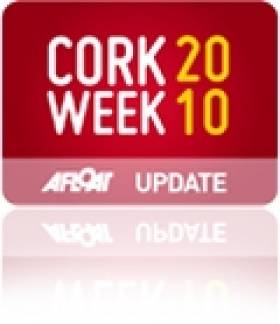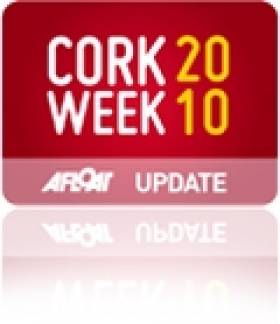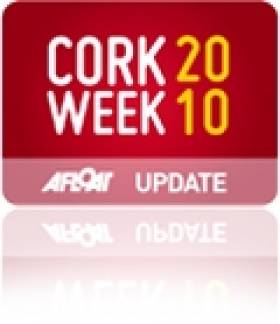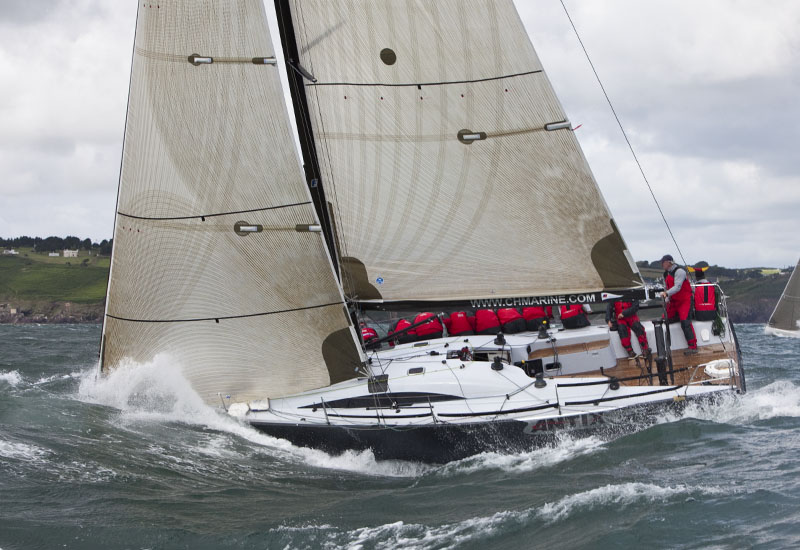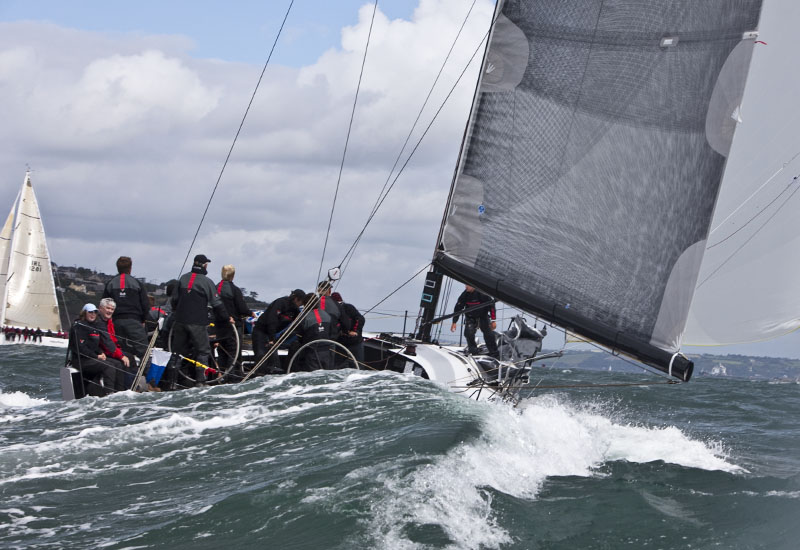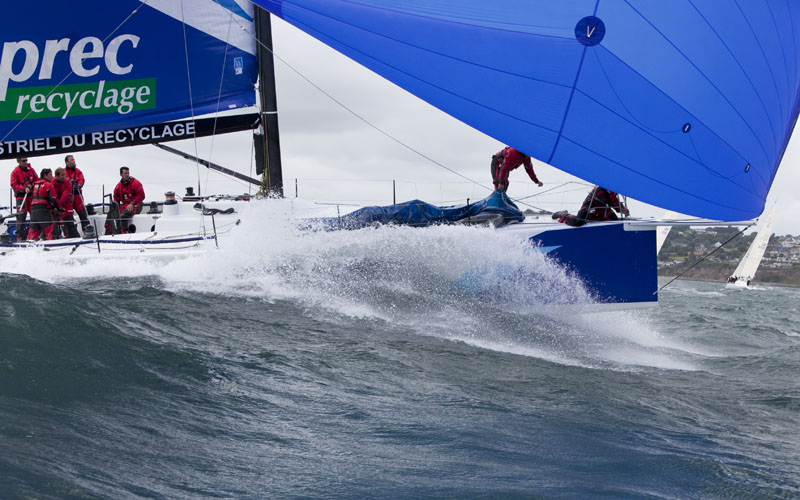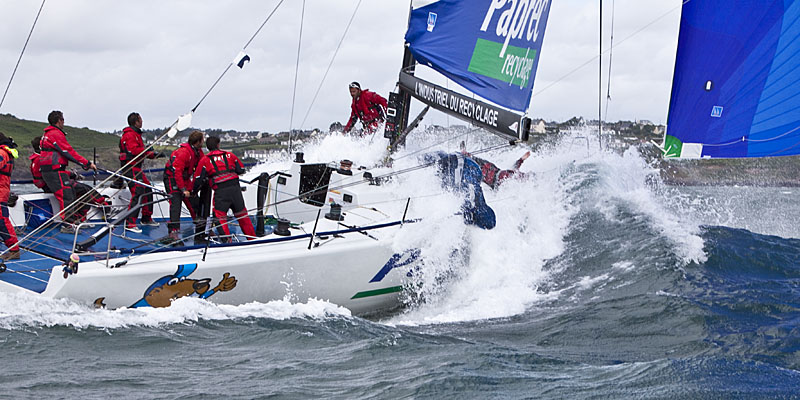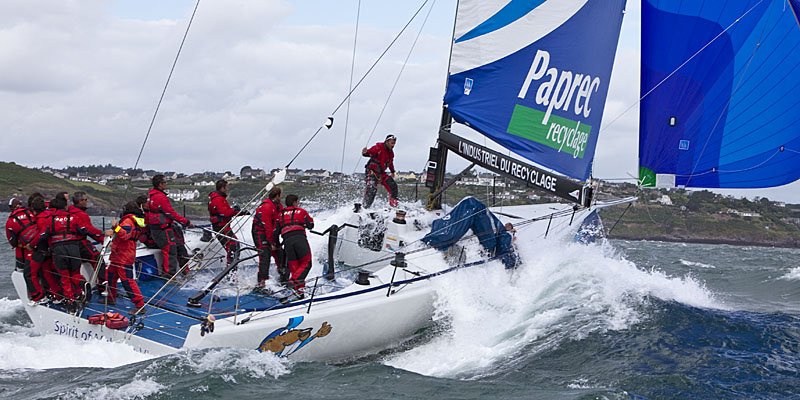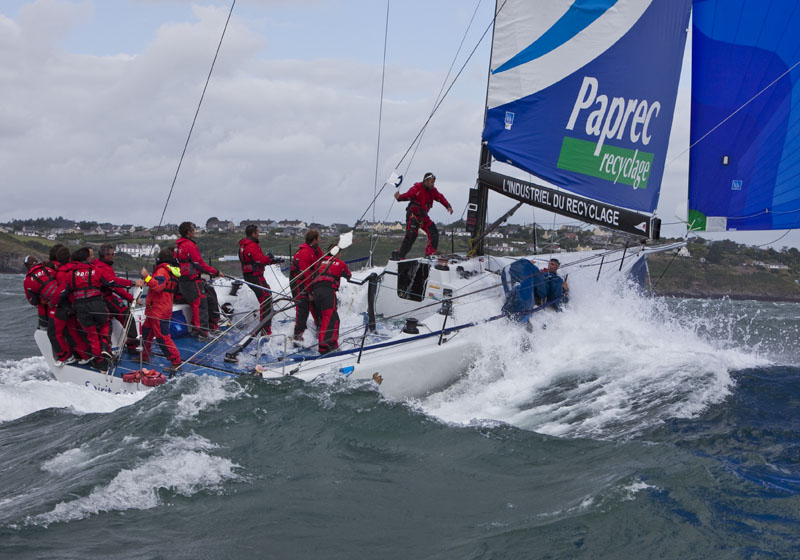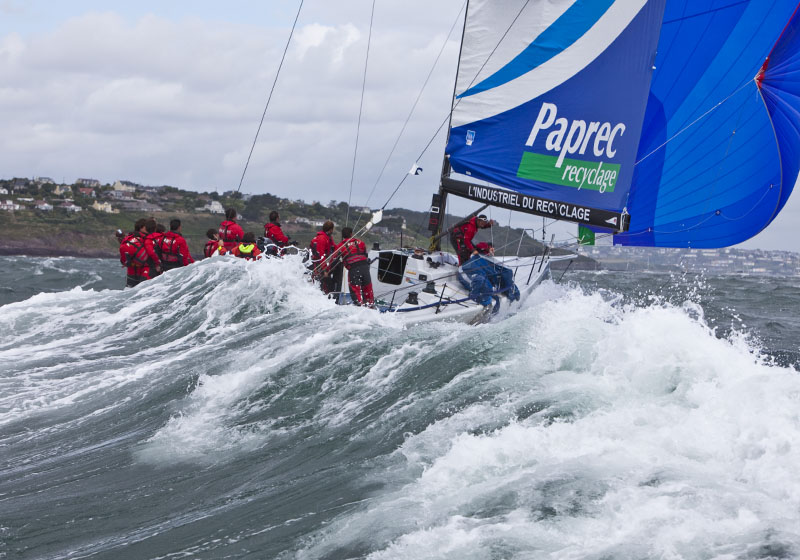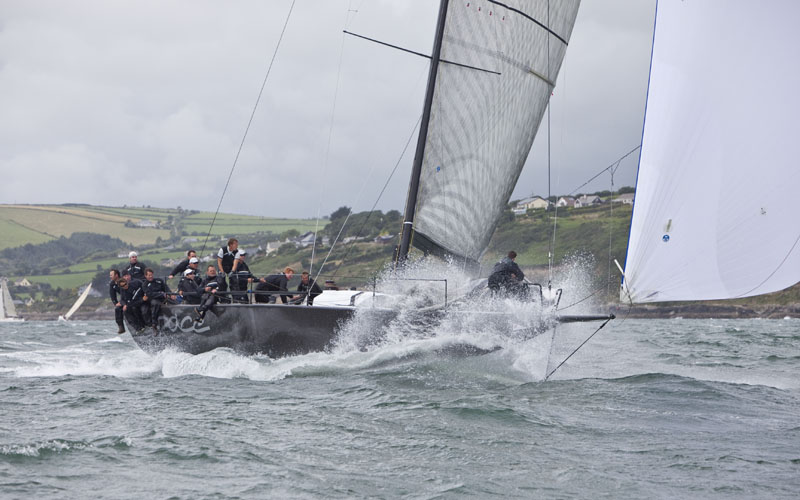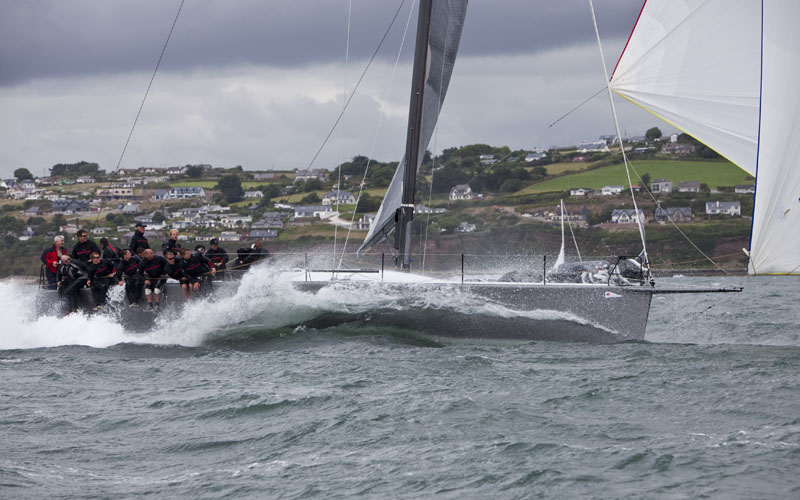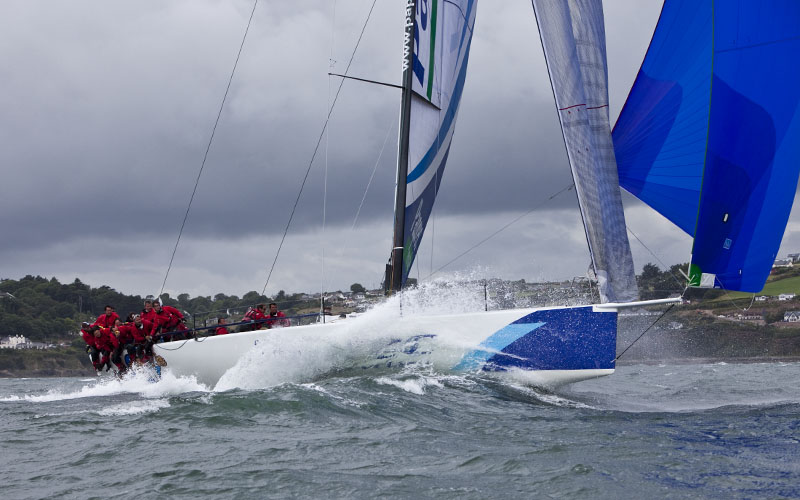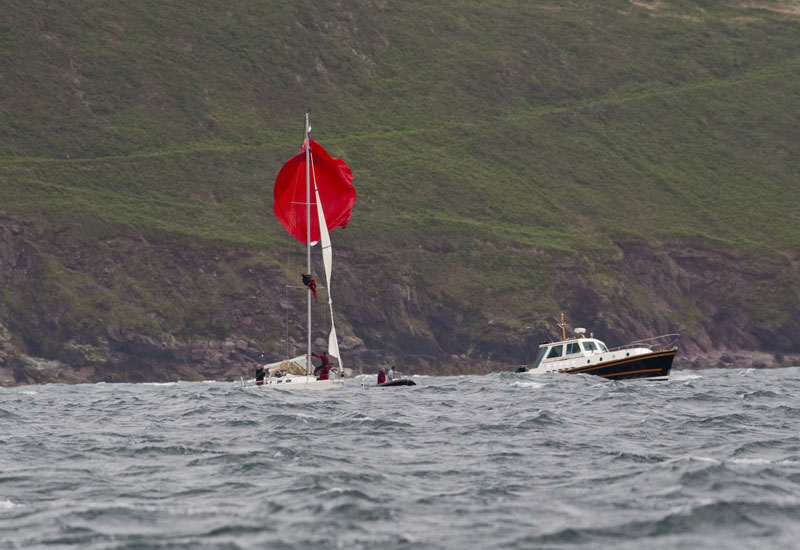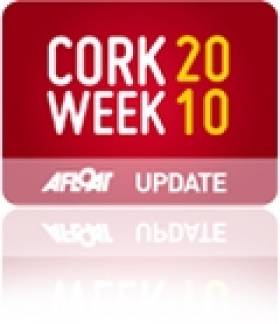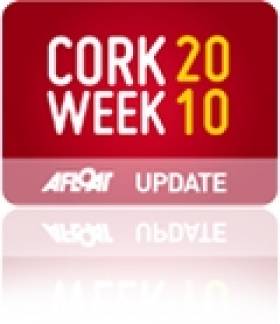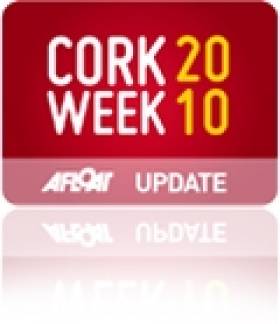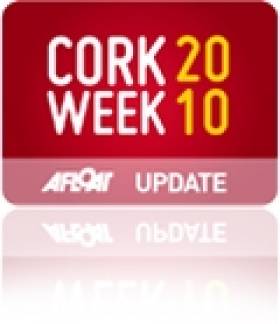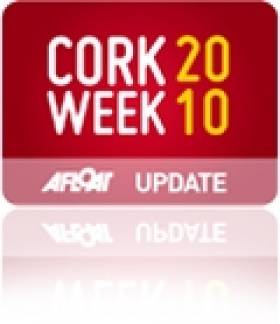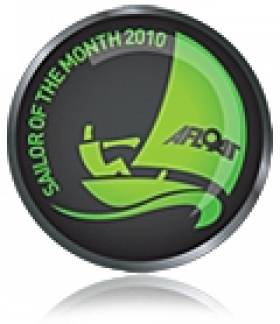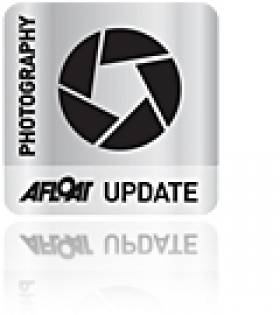Displaying items by tag: Royal Cork YC
It's no longer of Boat of the Week but boats of the week at Cork week this evening as Dave Dwyer's Mills 39, Marinerscove.ie and Paul Kirwan's Sigma 38, Errislannan have been jointly awarded Cork's top award. You could feel the tension on the dock, with virtually all the classes still to be decided, as the yachts motored out to the combat zone along the narrow confines of Cork River. The conditions had eased from the previous maelstrom, but this was a day were smart sailing in the combined 197-boat fleet put boats in winning positions.
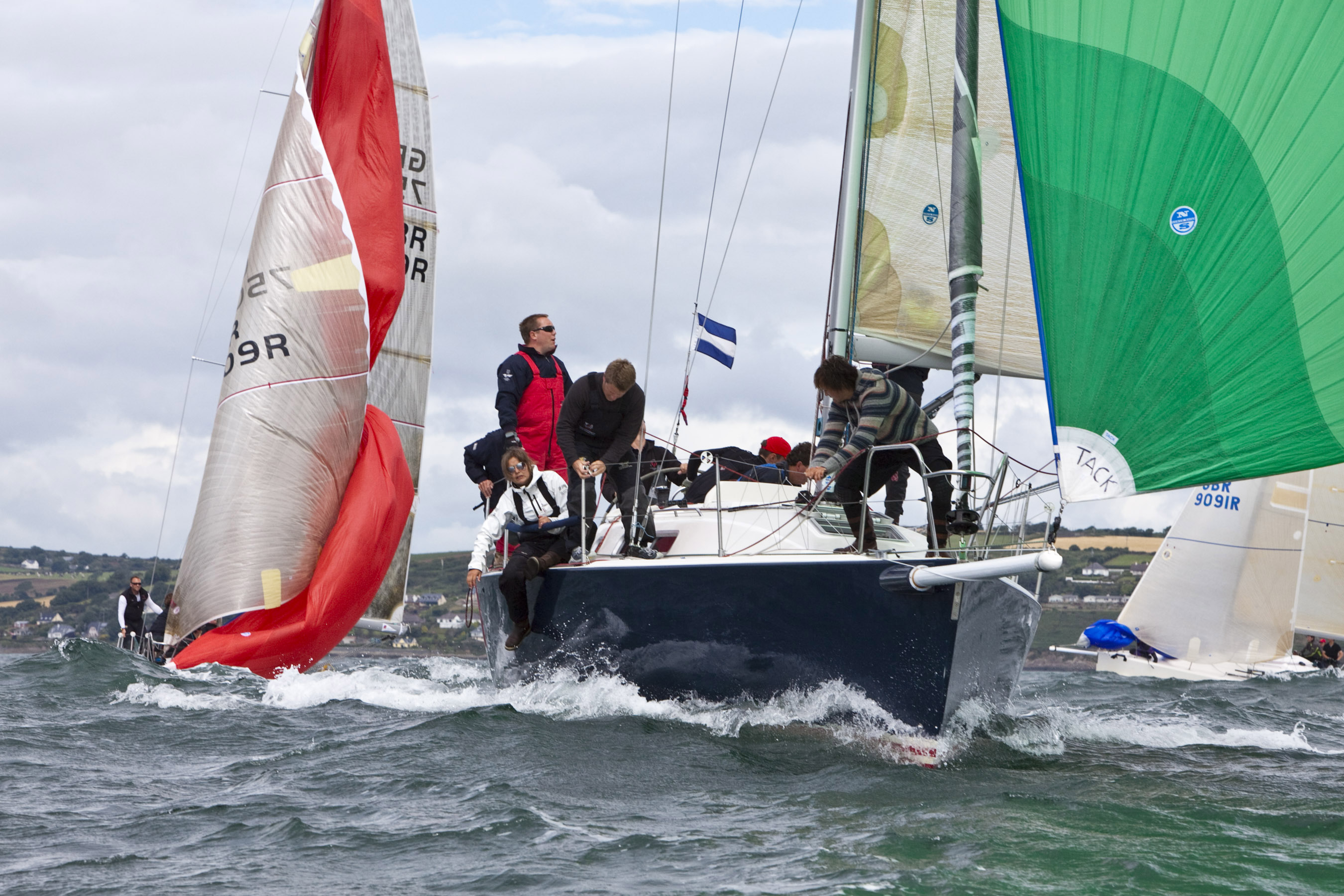
Blue Jay won the J109 European Championships at Crosshaven. Photo: Bob Bateman
Watery sunshine, 15 knots from the northwest were to provide some tricky conditions for all classes. Cork Harbour and the surrounding area have huge land effects on the wind, especially today, the gradient made for constant changes.
It proved to be a day for keeping heads out of the boat, looking for changes in the weather. However, that is only one part of the overall puzzle. Boat-on-boat tactics and strong tides are also in the mix. Racing today at Cork Week was like a game of three-dimensional chess.
IRC Super Zero
Johnny Vincent's TP52, Pace came out on top after five days of thrills and spills in the big boat class. Austin Fragomen's TP52, Interlodge was second but only on count back from Gray and Laidlaw's Farr 52, Bob.
Tied on points, Fragomen's TP52, shipped over form the USA to compete at Cork Week beat the Isle of Wight based Farr 52, by the virtue of winning one more race in the eight race series.
The Racing in Super Zero has been sensational this week but also pretty hard on the crew. Andy Oliver is the bowman on Johnny Vincent's TP52, Pace. He first came to Cork Week at just 17 years of age and since then he has raced all over the world;
"I have got to say that was the toughest week I have had for a long time, all of the crew on Pace did a great job, not just the bow but working on the pointed end with the boat screaming along at 24 knots is pretty tough! Cork Week is very unusual, in that it has a huge variety of courses that intensifies crew work. We are all a bit tired, but a fair few of the crew on Pace will be looking forward to a couple of pints of the black stuff in the yacht club after the prize giving."
IRC Zero
Dave Dwyer's Mills 39 Marinerscove.ie had a bad start to the regatta but showed great tenacity to come back with a vengeance to win the highly competitive class on the last race, as tactician Andy Beadsworth explains;
"We have made a few changes to the boat this season, including increasing the sail area to give the boat better light wind performance for the forthcoming Rolex Commodores Cup. A windy Cork Week answered a few questions about how we would go in heavier air. Our two results at the beginning meant we were playing catch up and we just kept chipping away. It has been a great regatta, a real punch-up with some well sailed boats."
Bernard Lambilliotte's Swan 45, Nemo of Cowes haS been the boat to beat in Class Zero, all week and will obviously be disappointed to lose out on the last day. Anthony O'Leary's Ker 39, Antix was third but finished the regatta in good shape.
J 109 European Championship
The crew on Greg Burgess's J 109, Bluejay punched the air with delight, after taking the gun in the first race of the day. All of the crew is from Wales and apart from Burgess, are all young lads as an ecstatic Burgess explains;
'We all go snowboarding together and we have never raced the boat as a crew before. I am 55 but although I am getting old, I feel like an 18 year old today! We didn't expect to win this in our wildest dreams. I stopped racing the boat three years ago, to drive my son around, competing for the British Optimist Team. The crew come from Swansea, Cardiff and North Wales, they have all been sleeping on the boat and partying every night. What a week!"
Brian Moreton's Juke Box was second overall and Ian Nagle and Paul O'Malley's Jelly Baby, snatched third place on the last day from Robert O'Leary's Jeroboam.
IRC One
There was an incredibly close finish in the last race, as the top three boats were separated by 26 seconds, on corrected time. Conor & Denise Phelan's Ker 37, Jump Juice snatched the class title by a single point from Robert Davies' Welsh team on Corby 36, Roxy 6. British Corby 37, Impetuous were third.
These three boats had a titanic struggle all week, especially as they were often side by side on the water. None of them scored worse than a fourth in the seven race series. IRC One produced probably the closest racing of any of the classes racing at Cork Week 2010. Jump Juice were also class champions in 2006.
Conor and Denise are based in Cork and feel Cork Week is a special regatta.
"Since Denise decided to buy Jump Juice, we have raced in the Solent, Scotland and Dun Laoghaire but Cork Week beats them all; the race management is first class and the variety of course and conditions always makes it interesting. We had incredibly close racing this week. It has been absolutely fabulous." Commented a delighted Conor Phelan
IRC Two
Paul O'Higgins' Corby 33, Rockabill V started the regatta in fine form but faltered half way, it was only on the last race that they came back, to clinch the class title from Sailing Logic's Reflex 38, Visit Malta Puma with Rob Mc Connell's A 35, Fool's Gold, finishing strongly to take third.
Paul O'Higgins, owner of Rockall V sums up the week; 'I think the crew on Rockabill V got a bit too complacent after a good start and enjoyed the full facilities of Cork Week, the day before we had a very breezy day, so some of the hard work was our own doing! However, all credit to the opposition, Puma and Fool's Gold sailed well and were worthy opponents."
IRC Three
John Moorehead & Chris Ferres J 35, Bengal Magic have had a cracking week and finished in style by taking a fifth win in the last race of the series but only be 15 seconds from Richard Calveley's Elan 37, Va Va Voom. Ross McDonald's X 332, Equinox will have enjoyed the fresh conditions at Cork Week and claimed second, by some distance from Martin Breen's Harley 33, That's Life!
IRC Four
Paul Kirwan's Sigma 38, Errislannan were assured of both the class title and European Championship and did not compete in the last race. Leaving Paul & Deirdre Tingle's First 31.7, Alpaca and Conor Ronan's Corby 26, Ruthless to battle it out for third. Alpaca beat Ruthless in the last race of the series to take the runner-up spot for the class with Ruthless third overall.
IRC Five
Vincent O'Shea's Corby 25, YANKS $ FFRANCS have had a great Cork Week and won the class by an eight point margin. The Corby 25 is often racing in close quarters with sister-ships and with 14 boats on the start line and many other boats in the race area, this was a factor in their ability to stay out of trouble and win the class.
John Allen's X 302, Antix finished in style, winning the last race of the series by just 29 seconds. Ted Crosbie's x 302, No Excuse was third in class. Event Chairman, Peter Deasy was racing on Sunfast 32, Bad Company. He was disqualified from the last race, proving there is fair racing for all at Cork Week!
IRC Six
O'Brian, Kenefick and Kenefick's Quarter Tonner, Tiger is a real head turning boat and was the only yacht to post straight bullets for the regatta but it wasn't as easy as the score line suggest and it never is, as co-owner, James O'Brian explains;
"Flor O'Driscoll is a top sailor and we had to be at the top of our game this week, especially as we needed to be ahead of him on the water, because of our handicap. It has been a hard week and a fair few of us are over 50, so we are a bit tired to be honest. But I ran this event in 1990 and I have never won it, I didn't think that it would take me 22 years."
Flor O'Driscoll's J 24, Hard on Port was second and Jason Losty's Thomas 25, Woody sailed a very consistent regatta to take third place.
Mixed Sportsboat and SB3 Class
Michael Wilson's 1720, YKnot was in impressive form all week, scoring eight podium finishes to claim the class title. Bryan Hassett's 1720, Dark Side was runner up and the two Hassett brothers were enjoying a pint at the Royal Cork Yacht Club after racing with other 1720 crews. Great racing and camaraderie, is what Cork Week is all about. Malcolm Thorpe's 1720, King Louie won the last race of the series to claim third but only on count-back from Denis Murphy's Aquatack.
Ben Duncan and Brian Moran's Sharkbait bit back after being called OSC in Race 5, to hold off Trevor D'Arcy's Bullet. Race 6 was a photo-finish, with just six seconds separating the two. Bullet won the penultimate race, putting pressure on Sharkbait but they held there nerve to take the last race and the class title by 19 seconds. Ronan Downing's SB3, Ronan Downing's Profile Park was third.
Class winner Ben Duncan was disappointed to miss out on racing on Thursday but he was delighted to come to Cork Week.
"We wanted to race, especially after getting called over the line the previous day but we made the most of it by going for lunch on our enforced lay-day at the stunningly beautiful East Ferry, in Cork Harbour. We have had a great time here in Cork."
White Sail One and Two
46 boats competed in the two classes over the regatta and they enjoyed a picturesque finale to Cork Week 2010 with the Harbour Race. The White Sail fleet are composed of teams that don't want to put together a full on race crew and prefer to sail with a smaller group of family and friends. What's more, many of these boat would not be competitive against the more high performance boats in the other classes. The White Sail Class gets them off the moorings and out into some of the best sailing grounds in the world.
In White Sail One, Philip Dilworth's Grand Soleil 40 was the winner and in Class Two, McCarthy, Clarke & McMullin's Half Tonner Harmony was first in class.
A huge crowd witnessed the prize giving, held at the Royal Cork Yacht Club, shortly after racing. Officiated by Cork Week Event Chairman, Peter Deasy and RCYC Admiral, Paddy McGlade.
It was decided that the Boat of the Week for Cork Week 2010 should be jointly awarded.
Joint Boat of the Week
Dave Dwyer's Mills 39, Marinerscove.ie
Paul Kirwan's Sigma 38, Errislannan
The Prix d'Elegance Trophy
Philip Scully's Custom Oyster 82, Starry Night of the Caribbean
The Sisk Trophy for best Corinthian yacht
Neil Martin's J 133, Jammy Dodger
Day 4 Cork Week Vid is a Cracker! Watch HERE!
Looking more like a leg from the Volvo Ocean Race, Cork Week yesterday enjoyed an epic day four and this Digby Fox video (below) proves it! A 20 knot ripper!
Day Three: More Cork Week Video Action Here!
Second video installment from Digby Fox in Crosshaven. Big Seas and big breeze on Day three of Cork Week.
DAY ONE: Cork Week Racing Opens in Style and Sunshine
Report plus Photos! There are plenty of strong home sailing performances from the first day of Cork week today and Irish boats are in control in IRC Zero, the J109s, IRC three and IRC divisions four, five and six. Its a great start to what the official press release is calling 'Costa del Cork' but locals know Cork Harbour is far better than that place. Cork week 2010 opened in spectacular sunshine this afternoon; an entirely appropriate antidote to the doom and gloom of recent months. Moderate breeze of 10-15 knots from the southeast, gave competitors a day to remember and there were many happy sailors returning to the dock this afternoon. Louay Habib joined them on the water and reports here class by class. Afloat Photographer Bob Bateman was on the water and in the air. His shots are below and his photo gallery of day one is here.
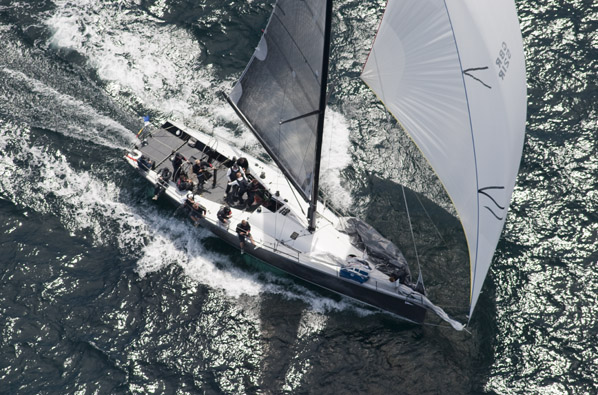
IRC Zero
Race Two for super zero was subject to a decision by the jury today but Super zero was still a clash of the titans on the Slalom course today and it was exciting stuff as Paprec Recyclage tactician, Sebastien Destremau explains: "We were happy with our boat speed and performance in Race one but it was pretty difficult out there, these boats are really powerful and the corners come up a bit too fast. The boats were really close together in Race Two. However the boats in the other classes which were on the same race course were not a problem as far as I am concerned."
Johnny Vincent's TP52, Pace came back in a light airs second race to win by a tight margin from Gray and Laidlaw's Farr 52, Bob with Paprec Recyclage in third. After two races the big boat class is led by Pace, Paprec Recyclage is second with Bob in third place.
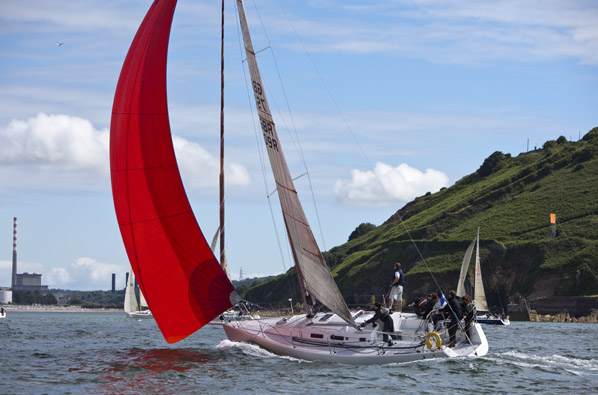
J/109 European Championships
Eighteen J 109s are competing at Cork Week for the European Championship and they enjoyed some fantastic racing today. Robert O'Leary, steering Jeroboam, got a cracking start, right under Weavers Point, they went on to win the race by over two minutes. Steven Tapper's Stalker was second and Jonathan & Andrea Tithecott's Judgment Day taking third.
Jeroboam is owned by Jim Prower from Britain but is crewed by students mainly from University College Cork, including Robert O'Leary, who is just eighteen years of age, in his first year at the University.
"We started right under Weavers point to get out of the adverse tide and got a bit of help from the surf down the shore. After that, getting under Carlisle Fort was the way to go, again due to the tide." explained Robert O'Leary.
Jeroboam led from the start and in clear air they were pulling away from the rest of the fleet, after a cracking first two legs, Jeroboam led the fleet out of the Harbour to Ringabella Bay and then headed offshore. Jeroboam were leading the fleet but only by about 30 seconds.
"The further offshore we went the more the wind started to go east and we got our lay-line spot on, we had a good run back but didn't pull away from the pack. We were still vulnerable but we have some great local knowledge and once we got into the harbour for the second time we felt that this would pay. We also managed to slow the opposition down by some good boat on boat work; after we rounded Cobh Mark, we hoisted our spinnaker and gybed immediately on to starboard, several boats behind us had to give way. With a comfortable lead, we could then sail more conservatively."
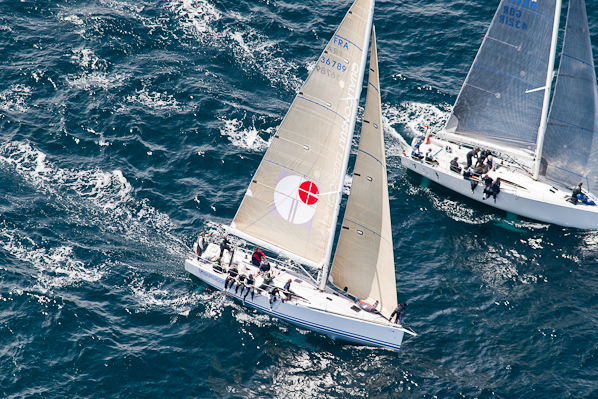
IRC Zero
Anthony O'Leary's Ker 39 had a solid start to the series and is the overnight leader. Class Zero has some exceptionally close racing and Antix tied with Kieran Twomey's Corby 38, Gloves Off on corrected time in Race Two. A second on their first race puts the Irish Rolex Commodores' Cup captain in pole position. Bernard Lambilliotte's Swan 45, Nemo of Cowes is second, finishing the day on a high note by taking Race Two. Gloves Off is third by just half of one point. It was a mixed day for Richard Matthews and his crew on Oystercatcher XXVI. The Humphreys 42 will have fancied their chances on the slalom course and took the gun in race one by a country mile but where over the line in Race Two and had to go back and take a 20% penalty, meaning that they drop out of the top three, at the end of the first day.
IRC One
It couldn't be closer, in IRC One. After two races, there is nothing to separate the top three boats. Richard Fildes, Corby 37, Impetuous, Conor Phelan's Ker 37, Jump Juice and Robert Davies, Corby 36, Roxy 6 are all tied on four points. Jump Juice had a cracking first race taking line honours and a win on corrected time by some margin. Roxy 6 will be representing Ireland in the forthcoming Rolex Commodores' Cup and Jump Juice and Impetuous are past entries. IRC One looks like it will be an intense battle.
IRC Two
Nineteen boats were jostling for position at Weavers Point in IRC Two. It was a fast reaching start and too many were over eager, causing Race Officer, David O'Brien, to send them back for a General Recall. The fleet got away second time and Wouter Borghijs A 35, Tontin powered into the lead, after hoisting a Code Zero and accelerating off at pace. Tontin looked to have an unassailable lead but it was Sailing Logic's Reflex 38, Visit Malta Puma that took the spoils, as skipper Tim Thubron explains:
"We have the highest handicap for the class and before the race, we thought that the Harbour Course may prove difficult for us, as it is difficult to get away from the other boats. However, I thought that the crew work today was excellent, especially for a team that has only be sailing together for a few days. The Harbour Course is a tricky place to sail and we paid careful attention to the chart and the depth.
Winning today, exceeded are expectations and so did the weather! We started in full oilskins but were soon peeling them off and enjoying some brilliant sailing. We are really looking forward to having a few beers and some food at the welcome party tonight."
Visit Malta Puma are the overnight leader in Class Three, just ahead of two Corby 33s. Barry Cunningham's Contango and Paul O'Higgins' Rockabill V.
IRC Three
Previous Cork Week Class winner, J 35, Bengal Magic had great day at the office winning both of today's races but Ross McDonald's X 332, Equinox is putting the pressure on with two second place results. Dermot Cronin's J 35, Mumbo is third. The 22 boat strong fleet enjoyed some spectacular conditions on the Trapezoid course, 3 miles offshore of Roches Point.
IRC Four
Patrick Kirwan's Sigma 38, Errislannan leads both the class and the Sigma European Championships with a first and a second in two races. Conor Ronan's Corby 26, Ruthless recovered from a fifth in Race One to win the last race of the day, to claim second place, overnight. Royal Cork's Alpaca owned by Paul & Deirdre Tingle had a consistent day and are third.
IRC Five
Vincent O'Shea's Corby 25, YANKS $ FFRANCS won both of today's races. Sistership, Thunderbird owned by Denis Coleman had a consistent day and are third with John Allen's X 302, Antix third. Ronan Lyden's Corby 25, Aurora looked to be going well with a second in the first race but placed 11th in the second to drop down the leader board.
IRC Six
Quarter Tonner, Tiger entered by the Kenefick's and James O'Brian did battle with Flor O'Driscoll's J 24, Hard on Port today. On the highly tactical, Windward Leeward Course. For the moment, Tiger are in front but Race One was the closest race of the day, in any class. Tiger taking the bullet by just 11 seconds, on corrected time. Paul Murray's Impala, Prometheus had a very consistent day and lies third.
Mixed Sportsboat & SB3s
The Welsh will be singing tonight but joined no doubt by the Irish. After two races there is nothing separating Michael Wilson's Welsh 1720, Yknot and Bryan Hassett's Irish 1720, Darkside. Malcolm Thorpe's 1720, King Louie is not far behind in third.
Ben Duncan and Brian Moran's SB3, Sharkbait were to strong for the fleet today, posting two bullets by a comfortable margin. Ronan Downing's Profile Park and Trevor D'Arcy's Bullet were second and third respectively. They will be hoping to get the better of Sharkbait on the Trapezoid Course tomorrow.
White Sail
Philip Dilworth's Grand Soleil 40, Orna was unstoppable in White Sail One posting two bullets by a handsome margin on the Olympic course. Dan O'Neill's IMX 38, Xerxes had a good day, as did Kevin Lane's Dufour 40, Aisha who are tied for second place.
In White Sail Two, McCarthy, Clarke & McMullin's Half Tonner, Harmony and Tom McNeice's Sigma 33, Minx III are tied for first place. Billy Duane's Sunlight 30, Expression posted to podium finishes and is just behind the front runners in third.
Cork Week 2010 was officially opened last night by Micheál Martin, Irish Minister for Foreign Affairs, with the assistance of Paddy McGlade, Admiral of the Royal Cork Yacht Club and Peter Deasy. Cork Week Event Chairman. It was a light-hearted affair and extremely well received by a huge gathering of competitors and event staff alike. Tonight Cork Week will throw a competitors' welcoming party with complimentary food and drink for all. After today's spectacular weather and champagne sailing, there looks like there could be more of the same tomorrow with perhaps more breeze in the late afternoon.
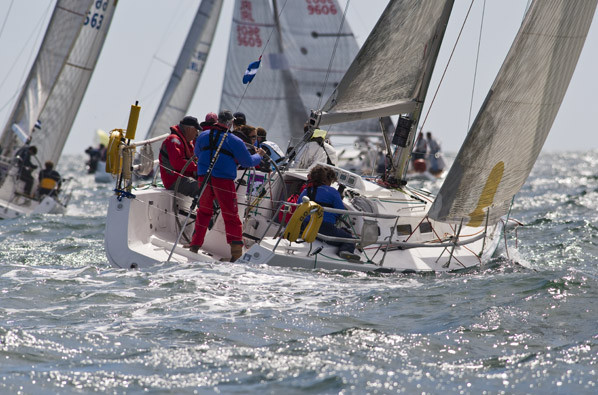
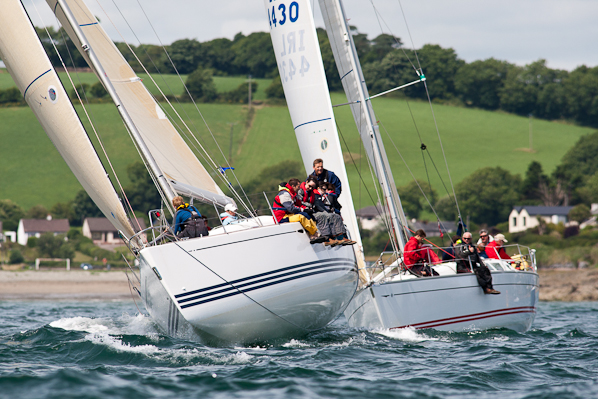
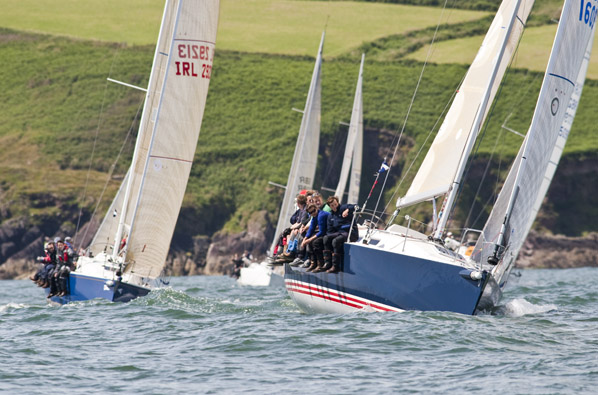
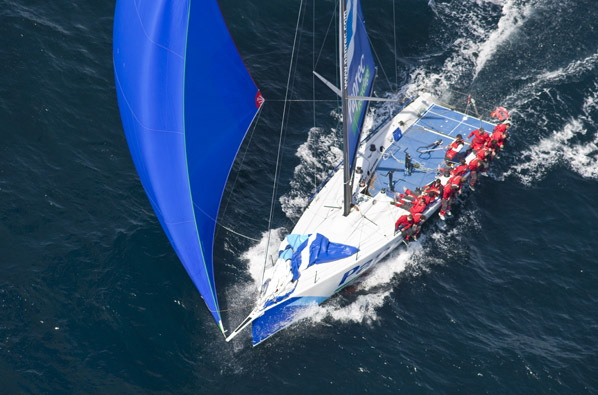
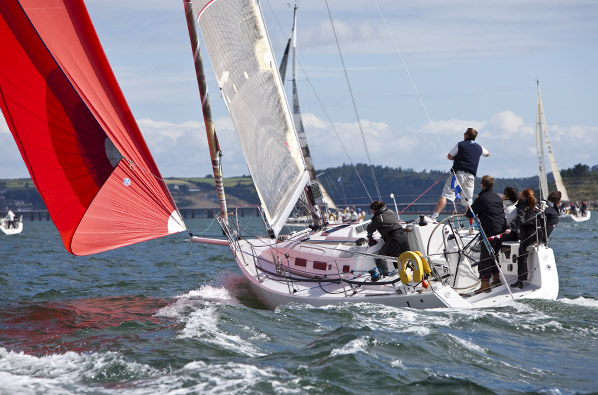
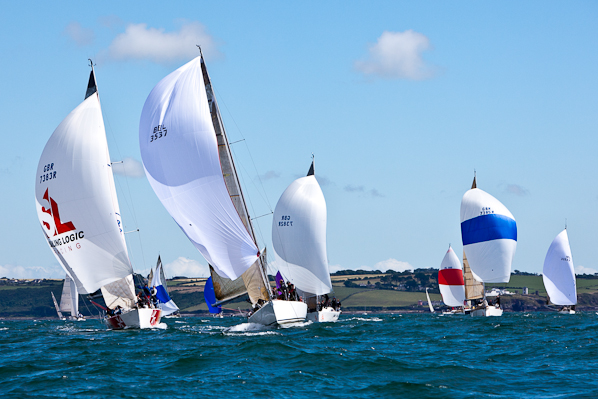
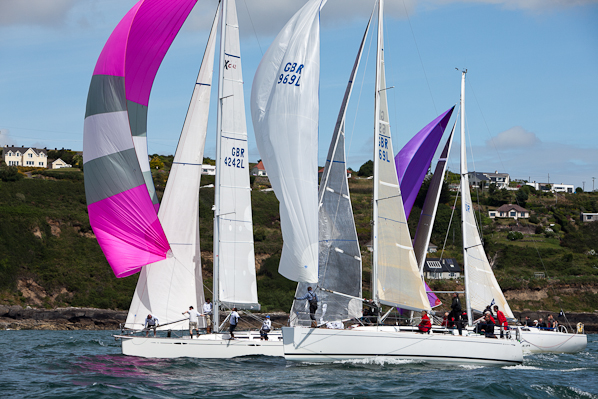
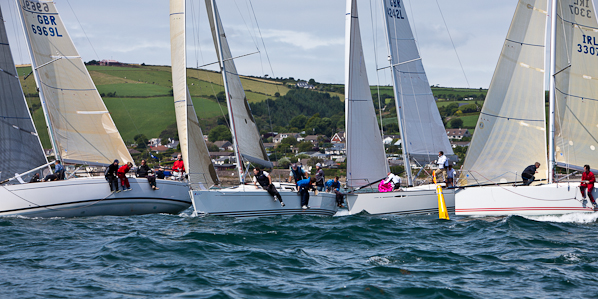
Full results HERE. More Photos HERE Afloat Cork Podcast HERE
O'Leary Shows Visitors Around Cork Harbour
Irish Olympic Star sailor and Cork harbour local Peter O'Leary was on board the American TP52 Interlodge for a gentle warm up in Cork Harbour this afternoon and Afloat went with him. From the East Coast of the USA, Austin Fragomen is sailing this ultra-modern TP52 designed by Judel Vrojlik. The boat has been optimized for IRC and is one of eight entries d in the regatta's super zero class. Racing starts in the morning. Bob Bateman's photos over the fold:
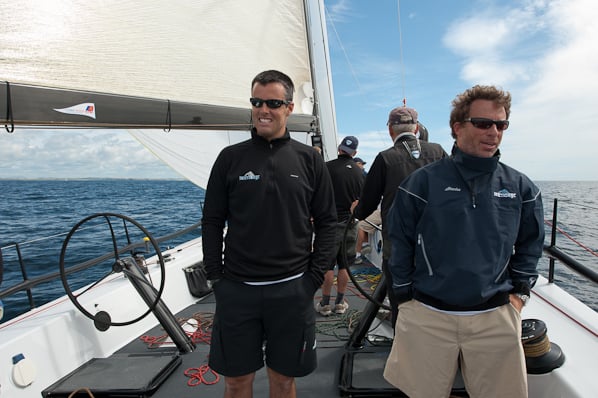
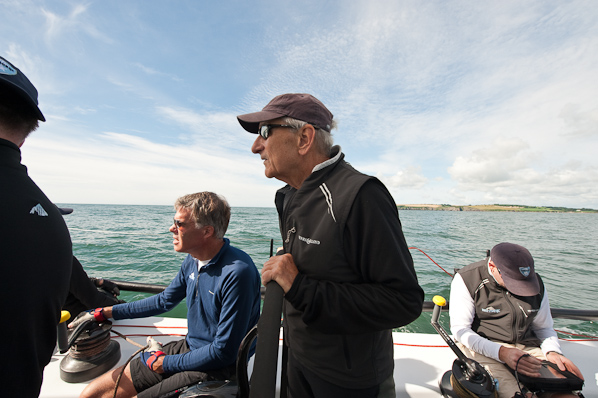
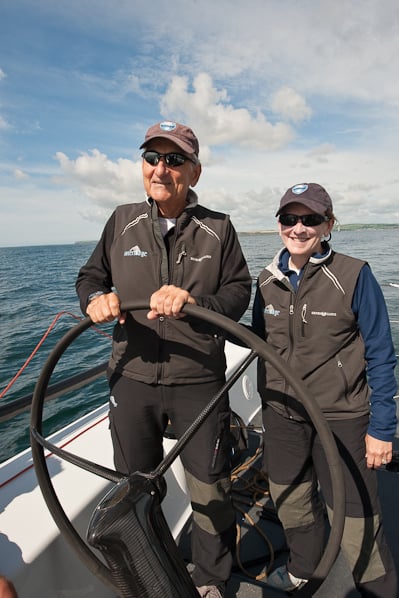
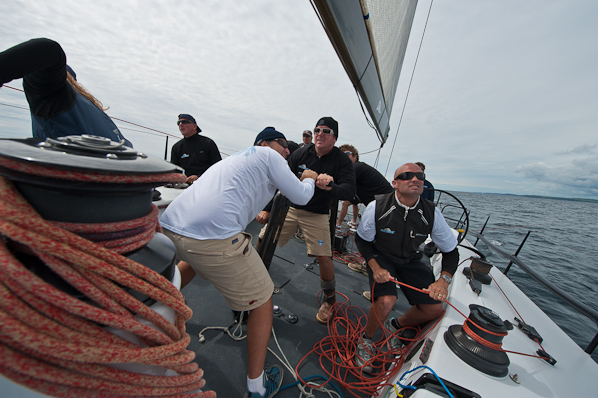
Cork Week Official Opening - Photos here!
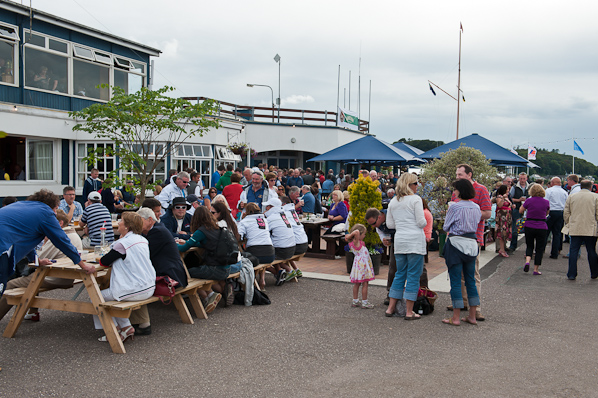
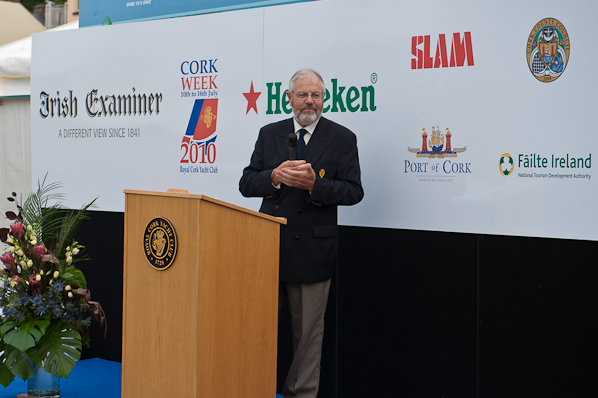
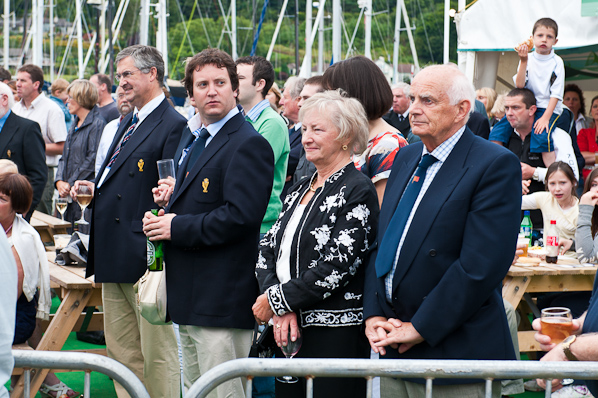
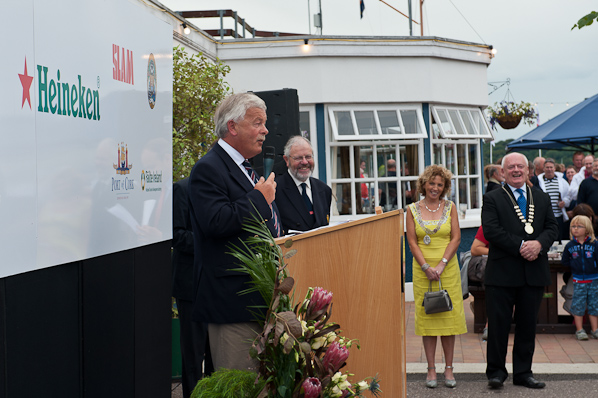
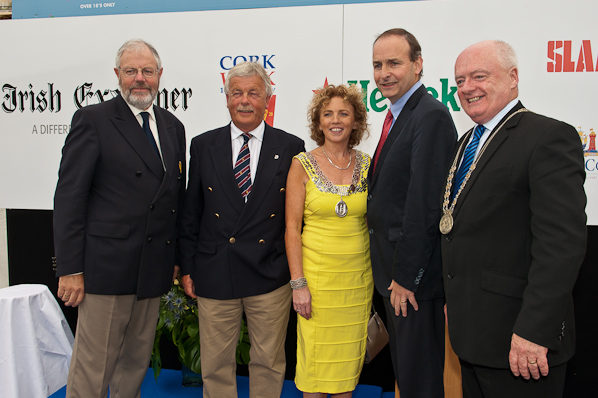
Dave Dwyer is 'Sailor of the Month' for June
Dave Dwyer of Cork is the Afloat.ie/Irish Independent “Sailor of the Month” for June with his convincing retention of the British Open IRC Championship over three days of racing which concluded in the Solent on Sunday June 27th.
A busy month of sailing had already produced several worthy contenders for the Sailor title. But Dwyer’s performance on the final weekend with the 39ft Marinerscove.ie (designed in 2006 by current Sailor of the Year Mark Mills of Wicklow) was in a league of its own.
The boat has of course been regularly updated and optimized during four busy years at the sharp end of national and international fleets. But even in these recessionary times, there are completely new and decidedly hot contenders coming on the scene,
Thus even as the Dwyer team – and it’s a formidable equipage - was shaping up for the Solent championship, right on Mills’ own doorstep in Wicklow it was being confirmed that the overall winner of the Round Ireland Race 2010 was the 46ft Tonnere de Breskens, designed by Jason Ker in 2008.
To add to the pain, second place went to another 2008 Ker boat, the 39ft Inis Mor (Bernard Gouy, Clifden Boat Club). In fact, there wasn’t a Mills design in the entire round Ireland fleet. But within four days, marinerscove.ie had done the business and redressed the balance against an international lineup off Cowes, clinching it with four wins on the final day of racing, and catapulting Dave Dwyer into Irish sailing’s kingpin spot for June.
More from W M Nixon on Dwyer's performance in today's Irish Independent here.
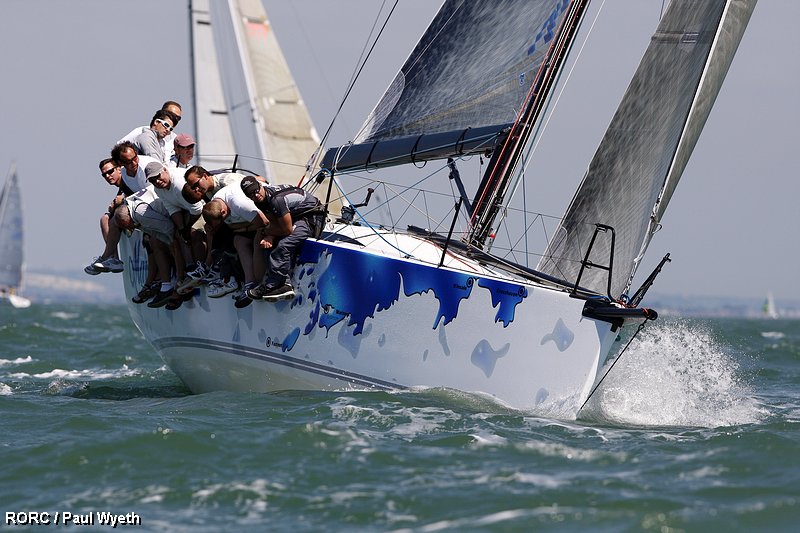
Dave Dwyer's Marinerscove in winning form on the Solent. Photo: Paul Wyeth
Royal Cork Short-handed Wine Race Action Photos Here!
Images from Royal Cork Yacht Club's shorthanded wine race are posted on the Afloat gallery HERE. The Ui Loingsigh of Glanmire sponsored fixture was a short, snappy and extremely enjoyable race in 12–knots of westerly breeze. Two spinnaker runs in a six leg race meant Bob Bateman had plenty of action to capture!


























